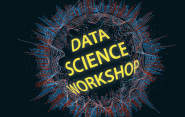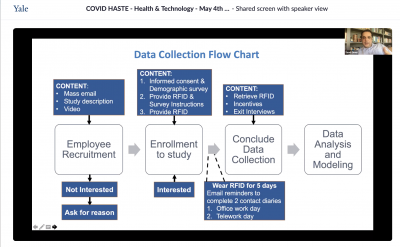HASTE Data Workshop: Using Technology to Curb COVID Spread

How we can use technology to reliably track and stem the spread of COVID-19 without diminishing personal security or privacy was among the topics discussed at the fourth HASTE Data Workshop.
The series, which is hosted over Zoom by SEAS Dean and Dean of Science in the Faculty of Arts and Sciences Jeffrey Brock, brings together researchers from across numerous disciplines to present COVID-19-related research and discuss how members of the Yale community can contribute.
 In a one-on-one discussion, Brock and Nicholas Christakis, Sterling Professor of Social and Natural Science, Internal Medicine & Biomedical Engineering, discussed a new app designed to predict outbreaks before they would normally be detected in a particular area. Christakis developed the app, set to be released soon, with Amin Karbasi, Assistant Professor of Electrical Engineering & Computer Science. It’s based in part on research that Christakis’ lab conducted several years on how to predict H1N1 outbreaks.
In a one-on-one discussion, Brock and Nicholas Christakis, Sterling Professor of Social and Natural Science, Internal Medicine & Biomedical Engineering, discussed a new app designed to predict outbreaks before they would normally be detected in a particular area. Christakis developed the app, set to be released soon, with Amin Karbasi, Assistant Professor of Electrical Engineering & Computer Science. It’s based in part on research that Christakis’ lab conducted several years on how to predict H1N1 outbreaks.
“We’ve shown that we can do this, but now we decided that we needed to build an app to do that and we needed to combine it with moden app technology, some new machine learning ideas, and some old ideas from network science,” Christakis said. He compared the app to Waze, an app that takes user-submitted information about traffic to provide optimal travel routes. One of its functions is to allow users to avoid traffic jams well before they encounter them.
Earlier in the day, the workshop featured talks from Saad Omer, director of the Yale Institute for Global Health and part of a COVID-19 advisory group for Yale President Peter Salovey; James Duncan, the Ebenezer K. Hunt Professor of Biomedical Engineering, Electrical Engineering & Radiology and Biomedical Imaging, Isabel Cortopassi, an associate professor of radiology.
Brock also led a panel discussion with Karbasi; Ann Kurth, Dean and Linda Koch Lorimer Professor at Yale School of Nursing; Gregg Gonsalves, assistant professor in epidemiology of microbial diseases; Michael Kane, assistant professor of biostatistics; and Vitor Pamplona, president of SciBR Foundation. Among other topics, they discussed contact tracing, a means of identifying people who have been infected and all the people that have been exposed to that person.
Go here for more information about the workshop series.

